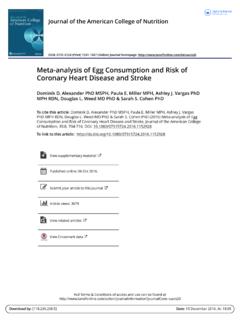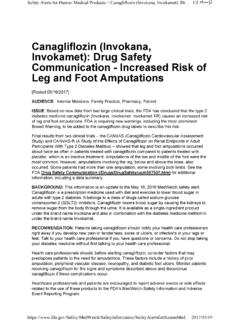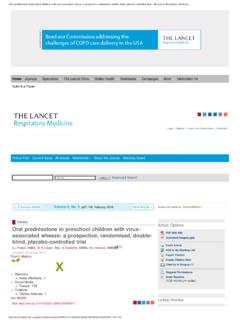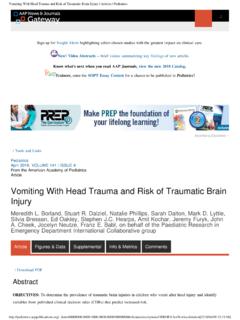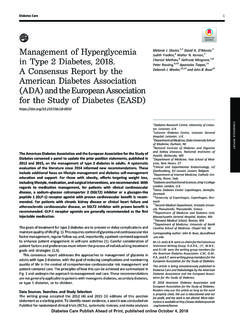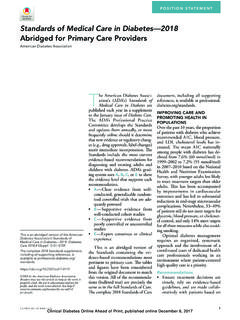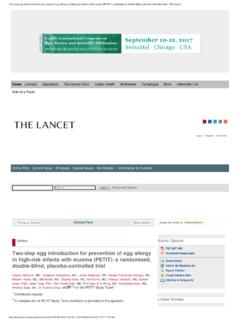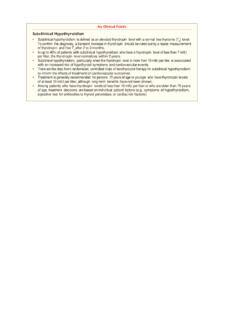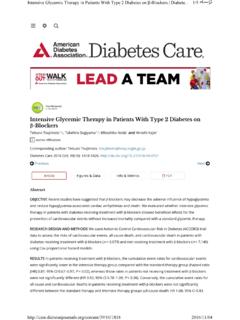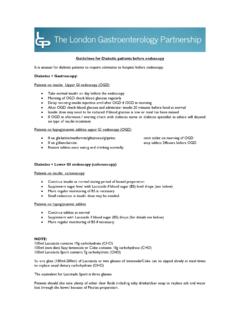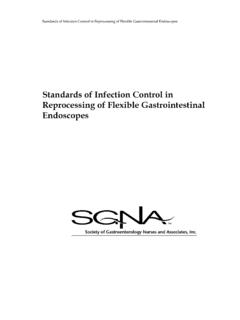Transcription of Management of patients on antithrombotic agents …
1 405 ChanfiFKL, et al. Gut 2018;67:405 417. of patients on antithrombotic agents undergoing emergency and elective endoscopy : joint Asian Pacific Association of Gastroenterology (APAGE) and Asian Pacific Society for Digestive endoscopy (APSDE) practice guidelinesFrancis K L Chan,1 Khean-Lee Goh,2 Nageshwar Reddy,3 Kazuma Fujimoto,4 Khek Yu Ho,5 Seiji Hokimoto,6 Young-Hoon Jeong,7 Takanari Kitazono,8 Hong Sik Lee,9 Varocha Mahachai,10 Kelvin K F Tsoi,11 Ming-Shiang Wu,12 Bryan P Yan,13 Kentaro Sugano14 AbstrActThis Guideline is a joint official statement of the Asian Pacific Association of Gastroenterology (APAGE) and the Asian Pacific Society for Digestive endoscopy (APSDE). It was developed in response to the increasing use of antithrombotic agents (antiplatelet agents and anticoagulants) in patients undergoing gastrointestinal (GI) endoscopy in Asia.
2 After reviewing current practice guidelines in Europe and the USA, the joint committee identified unmet needs, noticed inconsistencies, raised doubts about certain recommendations and recognised significant discrepancies in clinical practice between different regions. We developed this joint official statement based on a systematic review of the literature, critical appraisal of existing guidelines and expert consensus using a two-stage modified Delphi process. This joint APAGE-APSDE Practice Guideline is intended to be an educational tool that assists clinicians in improving care for patients on antithrombotics who require emergency or elective GI endoscopy in the Asian Pacific agents , which include antiplatelet agents and anticoagulants, are increasingly used in Asia.
3 Management of patients on antithrom-botics undergoing emergency or elective gastro-intestinal (GI) endoscopy has become a common and important clinical challenge. While practice guidelines have been developed by GI and endos-copy societies in the USA,1 Europe2 and the UK,3 it was uncertain whether they should be fully adopted in the Asian Pacific region. In September 2015 the Asian Pacific Association of Gastroenter-ology (APAGE) and the Asian Pacific Society for Digestive endoscopy (APSDE) appointed KS and FKLC to form an ad hoc working group to eval-uate current practice guidelines on the manage-ment of patients on antithrombotics undergoing GI endoscopy .
4 In collaboration with the Institute of Digestive Disease of The Chinese University of Hong Kong (CUHK), we systematically reviewed the evidence supporting published guidelines. We concluded that the available practice guidelines in Western countries could not completely meet the specific needs of the Asian Pacific region. For example, many Asian countries have a high case load of non-variceal upper GI bleeding. Current guidelines do not provide comprehensive guidance on the Management of GI bleeding in patients with high thromboembolic risks. Another example is that invasive endoscopic procedures such as endoscopic submucosal dissection (ESD) are more commonly performed in Asia than in Western countries due to the high prevalence of certain GI cancers.
5 Further-more, we noticed inconsistencies between different guidelines and raised doubts about certain recom-mendations (box 1).In June 2016 a steering committee representing the APAGE and the APSDE (FKLC and KS) and a member nominated by the Japanese Circulation Society (SH) was established to develop prac-tice guideline statements. The steering committee invited members to form a Joint Task Force to participate in the process of finalising guideline development for the Asian Pacific region. Task Force members included gastroenterologists, endoscopists, cardiologists, neurologists and public health specialists.
6 This joint APAGE-APSDE Prac-tice Guideline is intended to be an educational tool that assists clinicians in improving care for patients on antithrombotics who require emergency or elec-tive GI endoscopy in the Asian Pacific region. The Task Force is aware of the fact that clinical deci-sions for individual patients may lead to deviations of practice from these guidelines. Therefore, this set of guidelines should not be construed as estab-lishing a legal standard of care or as encouraging, advocating, requiring or discouraging any partic-ular performed a systematic literature search to review the Management of oral antithrombotic agents in patients undergoing GI endoscopy .
7 Searches of the OVID MEDLINE database were performed using keywords related to antithrombotic to cite: Chan FKL, Goh K-L, Reddy N, et al. Gut 2018;67:405 numbered affiliations see end of toProfessor Francis K L Chan, Department of Medicine and Therapeutics, The Chinese University of Hong Kong, Hong Kong, China; fklchan@ cuhk. edu. hkReceived 23 August 2017 Revised 6 December 2017 Accepted 9 December 2017 Published Online First 13 January on February 14, 2018 - Published by from 406 Chan FKL, et al. Gut 2018;67:405 417. , gastrointestinal and endoscopy . The search duration was from 1 January 1990 to 31 July 2016. Publications were identi-fied by title; their relevance was then determined by reviewing the abstract of all records.
8 Studies were excluded if the content was considered irrelevant. The initial guideline statements were drafted based on published systematic reviews, meta-analyses, randomised controlled trials and prospective and retrospective observational studies. A collection of selected literature was made available to all panel two-stage modified Delphi process was used to develop consensus. The first vote was conducted anonymously with an internet-based voting platform. Each member was asked to rank each statement on a 6-point Likert scale, where A+ indicated agree strongly and D+ indicated disagree strongly. Feedback was solicited on the statements and the results were collated (vote 1).
9 Agreement with a statement (A+ or A) by at least 80% of the Task Fforce was defined a priori as consensus. A face-to-face meeting of the Task Force was held on 2 3 September 2016 in Tokyo, Japan. During the meeting the results of vote 1 were shown, and suggested modifications to the statements were discussed. Members discussed statements with divergent opin-ions. A second vote was cast on all statements by using electronic keypads to ensure anonymity (vote 2). Focused discussion was carried out on those statements that failed to reach consensus, followed by a third vote, again by using electronic keypads (final vote). The consensus method did not force agreement.
10 The level box 1 Major differences between Joint APAGe-APsde Practice Guidelines and other guidelinesnon-variceal upper GI bleedingPlatelet transfusion for life-threatening bleeding APAGE-APSDE: not recommended ASGE: an option for patients on antiplatelet agents BSG-ESGE: an option for patients on DOACsPatient on DAPT APAGE-APSDE: continue aspirin, withhold second antiplatelet agent for up to 5 days after endoscopic haemostasis ASGE: discuss with cardiologist ESGE: continue aspirin, consult cardiologist for resumption of second antiplatelet agentPatients on warfarin APAGE-APSDE: low-dose vitamin K (1 mg) for warfarin reversal ESGE and ACCP: 5 10 mg of vitamin K for warfarin reversalResumption of warfarin APAGE-APSDE: resume warfarin by day 3 once adequate haemostasis is achieved; consider bridging with unfractionated heparin if high thrombotic risk (box 2) ESGE: resume warfarin between 7 and 15 days following the bleeding event for most patients ; no mention about bridgingResumption of DOACs APAGE-APSDE: resume DOACs by day 3 once adequate haemostasis is achieved.
